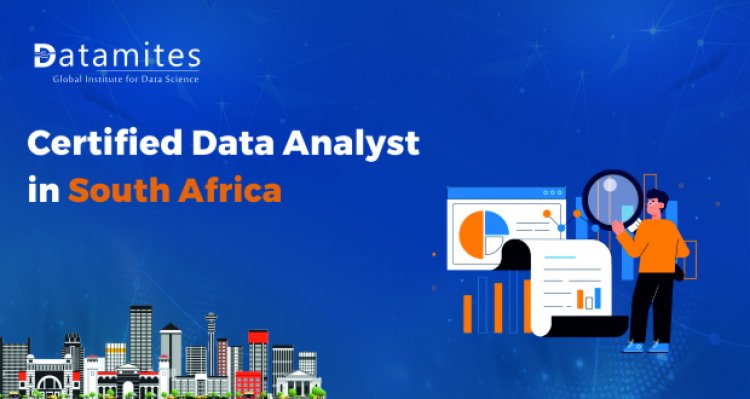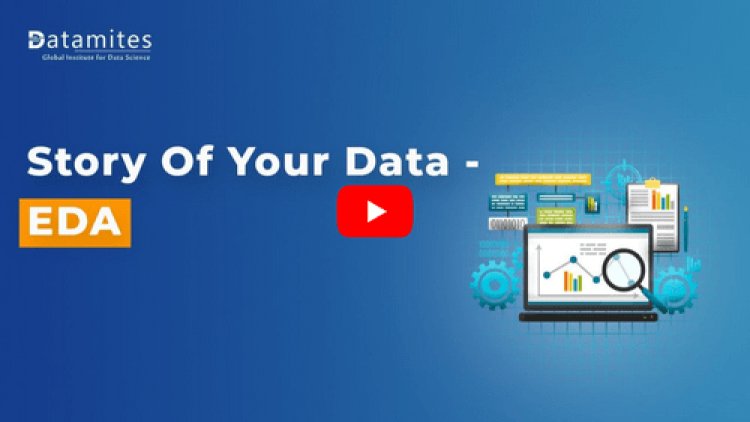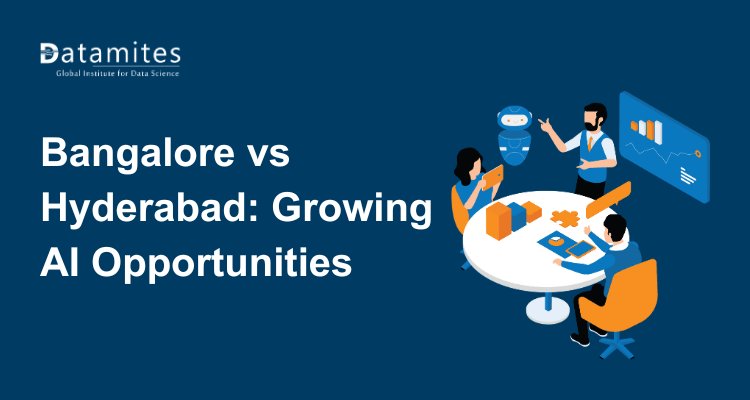How much is the Certified Data Analyst Course Fee in South Africa?

Embarking on a career as a data analyst in South Africa can be an exciting and promising path, given the growing demand for skilled professionals in the field of data analytics. One crucial aspect to consider when pursuing this career is the course fee for data analyst training in South Africa. Understanding the investment required for acquiring the necessary skills and knowledge is essential for planning your educational journey effectively. Moreover, completing a data analyst course can significantly enhance your prospects of building a bright career in this high-demand field.
According to Global Data, in 2021, the worldwide data and analytics market held a valuation of approximately US$93.08 billion. It is projected to exhibit a compound annual growth rate (CAGR) of 8.1% over the next five years, reaching a market value of about US$137.51 billion by 2026. Investing in a data analyst course in South Africa can be a wise decision for individuals aspiring to build a bright career in the field of data analytics. While considering the course fee, it is crucial to evaluate the benefits it offers in terms of skill development, industry relevance, networking, and professional certification. By equipping yourself with the necessary knowledge and skills through a reputable data analyst course in South Africa, you can enhance your career prospects and position yourself for success in a data-driven landscape.
How to become a data analyst in South Africa?
To become a data analyst in South Africa, you can follow these steps:
- Education and Qualifications:
- Obtain a bachelor’s degree in a relevant field such as mathematics, statistics, computer science, or economics. Some universities in South Africa offer specific programs in data science or analytics.
- Consider pursuing a master’s degree or higher qualification in data science, business analytics, or a related field to enhance your knowledge and expertise.
2. Develop Analytical Skills:
- Gain proficiency in statistical analysis, data manipulation, and data visualization using software such as Python, R, SQL, and Excel.
- Acquaint yourself with various machine learning techniques and algorithms.
- Learn how to extract insights from data and present findings in a clear and meaningful way.
3. Gain Practical Experience:
- Look for internships or entry-level positions that provide hands-on experience with data analysis. This can assist you in developing a portfolio of projects and showcasing your skills to prospective employers.
- Participate in Kaggle competitions or other data analytics challenges to sharpen your problem-solving abilities and showcase your abilities.
4. Networking and Professional Development:
- Join local data science or analytics communities and attend meetups, conferences, or workshops. Engaging with professionals in the field can provide valuable insights and networking opportunities.
- Consider joining professional organizations like the Data Science Society of South Africa (DS3) or the South African Statistical Association (SASA) to connect with fellow data analysts and stay updated on industry trends.
5. Enhance Your Communication Skills:
Data analysts often need to convey complex information to non-technical stakeholders. Work on improving your communication and presentation skills to effectively communicate your findings and insights.
6. Stay Updated:
Data analysis is a rapidly evolving field, so it’s important to stay updated with the latest tools, techniques, and trends. Follow relevant blogs, read books, and engage in online courses or certifications to continue learning and expanding your skill set.
7. Job Search and Applications:
- Search for data analyst positions on online job portals, company websites, and professional networking platforms.
- Tailor your resume and cover letter to highlight your relevant skills, education, and experience in data analysis.
- Prepare for interviews by practising data analysis-related questions and showcasing your problem-solving abilities.
8. Live-project internship
- Internships on active projects offer data analytics experts the chance to obtain practical experience.
- Live project internships straddle the conceptual and applied learning divide.
9. Certifications
- Validates proficiency and knowledge in the field.
- Demonstrates a commitment to professional development and staying updated with industry best practices.
- In the field, certifications from recognised organisations like Microsoft or IBM are especially valuable.
10. Resume Preparation
- Highlighting relevant skills and experience.
- Technical proficiency in Tableau, Power BI, Python, R, and SQL.
- Emphasis on previous work in projects including data analysis, statistical modelling, and data visualisation.
- Displaying a solid command of computer languages, analytical thinking, and data querying
Remember, building a career in data analysis requires continuous learning and adaptation. By staying dedicated, acquiring practical experience, and networking with professionals, you can increase your chances of becoming a data analyst in South Africa.
Refer these articles for more information:
- Data Analytics in Logistics
- Understanding the Role that Data Analytics plays in Manufacturing
- How is Data Analytics Influencing the Educational Sector?
What does a data analyst do?
A data analyst is responsible for collecting, analyzing, and interpreting large sets of data to derive meaningful insights and support decision-making within an organization. Their primary role revolves around transforming raw data into actionable information that can drive business strategies, improve operational efficiency, and solve problems. Here are some specific tasks that data analysts typically perform:
- Data Collection: Data analysts, equipped with their data analytics training course in Cape Town, gather data from diverse sources like databases, spreadsheets, or APIs. They play a vital role in ensuring the accuracy, completeness, and reliability of the data by conducting data cleaning and organizing it for analysis. This process involves tasks such as removing duplicates, handling missing values, and transforming the data into a suitable format, enabling them to derive meaningful insights from it.
- Data Cleaning and Preprocessing: Data often contain errors, inconsistencies, or missing values. Data analysts clean and preprocess the data by removing duplicates, correcting errors, filling in missing values, and transforming data into a suitable format for analysis.
- Data Analysis: Using statistical techniques, data analysts explore and analyze datasets to identify patterns, trends, and relationships. They apply methods such as descriptive statistics, regression analysis, hypothesis testing, and data visualization to uncover insights and draw conclusions.
- Report Generation and Visualization: Data analysts create reports, dashboards, and visualizations to present their findings in a clear and concise manner. They use tools like Excel, Tableau, Power BI, or Python libraries (such as Matplotlib or Seaborn) to create charts, graphs, and interactive visual representations of data.
- Performance Tracking and Monitoring: Data analysts develop and implement metrics, key performance indicators (KPIs), and monitoring systems to track the performance of various business processes, marketing campaigns, or operational activities. They identify areas for improvement and provide recommendations based on data analysis.
- Data-Driven Decision Making: Data analysts collaborate with stakeholders, such as managers or executives, to understand their information needs and help them make data-driven decisions. They provide insights, forecasts, and recommendations based on data analysis to support strategic planning and operational decision-making processes.
- Data Quality Assurance: Data analysts ensure data quality and integrity by implementing data governance processes, conducting data audits, and establishing data quality standards. They monitor data accuracy, consistency, and security to maintain reliable and trustworthy data.
- Continuous Learning and Improvement: Data analysts stay up-to-date with the latest tools, techniques, and trends in data analysis. They continuously enhance their skills through self-learning, attending training sessions, and participating in professional development activities.
It’s worth noting that the specific responsibilities of data analysts may vary depending on the industry, organization, and level of seniority. The salary of a data analyst in South Africa ranges from ZAR 294,492 per year according to the PayScale report. Some data analysts may also be involved in advanced analytics techniques, such as predictive modeling or machine learning, depending on their expertise and the organization’s requirements.
Read these articles:
- Certified Data Analyst Course Fee Thailand
- Certified Data Analyst Course Fee in Pakistan
- Certified Data Analyst Course Fee in USA
What is the DataMites Certified Data Analyst Course Fee in South Africa?
DataMites is a globally recognized training institute that provides data analytics training in South Africa.
DataMites, a prestigious training institute, offers the premium “Certified Data Analyst Course in South Africa.” This comprehensive program covers a range of topics including a No-code course, Excel, MySQL, PowerBI, and Tableau. The course is delivered online, making it accessible to individuals in South Africa. It spans a duration of six months, providing 400 hours of learning, which incorporates 20 hours of live-online training. Additionally, participants are granted one year of access to Elearning resources. Notably, the course has received approval from IABAC, a globally recognized organization, which adds to its credibility and industry acceptance. Successful completion of the program leads to the attainment of a Data Analytics certification in South Africa conferred by DataMites.
DataMites provides key features for Certified Data Analyst Course in South Africa as follows:
- Ashok Veda as an expert trainer,
- A specialised course curriculum,
- High-quality study materials,
- Internship opportunities,
- Case studies,
- 1 Client and 10 capstone projects
- Intensive live online training
- Resume Preparation
DataMites provides online data analytics training in South Africa, which blends theoretical concepts with practical applications. The training program is designed to equip participants with the essential skills and knowledge required for a successful career in the field of data analytics.
Certified Data Analyst Course
How is DataMites providing Certified Data Analyst Course Fee in South Africa?
DataMites is a highly regarded training institute known worldwide for its diverse range of data analytics courses, including Certified Data Analyst Courses in South Africa. When it comes to pricing, DataMites maintains a transparent and competitive approach. Typically, the course fees for data analyst training in South Africa fall within the range of ZAR 30,000 to ZAR 40,000.
DataMites is committed to ensuring accessibility and affordability for individuals aspiring to become data analysts. To achieve this, they provide flexible payment options, installment plans, and even scholarships. At DataMites, the certified data analyst course fee in South Africa ranges from ZAR 29,010 but students have the opportunity to avail of it at an affordable price of ZAR 16,460 for live-online training. Additionally, for the blended course, the course fee ranges from ZAR 14,510 with students benefiting from a discount rate of ZAR 9,429.
Read the following articles:
- Certified Data Analyst Course Fee in Australia
- Certified Data Analyst Course Fees in UK
- Certified Data Analyst Course Fee Nepal
Summary:
The Certified Data Analyst Course Fee in South Africa can vary depending on factors such as the training institute, course duration, curriculum, and additional benefits offered. It is recommended to research and compare different data analytics training institutes to obtain accurate and up-to-date information on course fees. Some institutes may offer flexible payment options or installment plans to make the course more affordable and accessible. Investing in a certified data analyst course from a reputable data analytics training institute in Johannesburg can provide valuable skills for a successful career in data analytics in the city of South Africa. When evaluating the course fee, it is important to consider the quality of the course content, industry recognition, and practical hands-on training provided. By acquiring the necessary expertise through a certified data analyst course, individuals can enhance their career prospects in the growing field of data analytics in South Africa.
What is Exploratory Data Analysis







